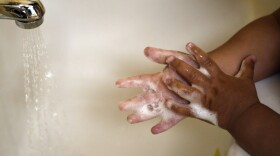Patti Neighmond
Award-winning journalist Patti Neighmond is NPR's health policy correspondent. Her reports air regularly on NPR newsmagazines All Things Considered, Morning Edition, and Weekend Edition.
Based in Los Angeles, Neighmond has covered health care policy since April 1987. She joined NPR's staff in 1981, covering local New York City news as well as the United Nations. In 1984, she became a producer for NPR's science unit and specialized in science and environmental issues.
Neighmond has earned a broad array of awards for her reporting. In 1993, she received the prestigious George Foster Peabody Award for coverage of health reform. That same year, she received the Robert F. Kennedy Award for a story on a young quadriplegic who convinced Georgia officials that she could live at home less expensively and more happily than in a nursing home. In 1990, Neighmond won the World Hunger Award for a story about healthcare and low-income children. She received two awards in 1989: a George Polk Award for her powerful ten-part series on AIDS patient Archie Harrison, who was taking the anti-viral drug AZT; and a Major Armstrong Award for her series on the Canadian health care system. The Population Institute, based in Washington, DC, has presented its radio documentary award to Neighmond twice: in 1988 for "Family Planning in India" and in 1984 for her coverage of overpopulation in Mexico. Her 1987 report "AIDS and Doctors" won the National Press Club Award for Consumer Journalism, and her two-part series on the aquaculture industry earned the 1986 American Association for the Advancement of Science Award.
Neighmond began her career in journalism in 1978, at the Pacifica Foundation's DC bureau, where she covered Capitol Hill and the White House. She began freelance reporting for NPR from New York City in 1980. Neighmond earned her bachelor's degree in English and drama from the University of Maryland, and now lives in Los Angeles.
-
NewsAccording to data reported to the CDC, 121 children died from COVID-19 between February and July of this year. And 78% of the children who died were Hispanic, Black or Native American.
-
In major cities, at least 1 in 5 Americans reported being unable to get medical care or delaying medical care for serious problems due to the pandemic, according to a new poll by NPR and two others.
-
Some COVID-19 patients have mild to moderate symptoms and recover quickly, but others suffer for months. And scientists don't know why some are more susceptible to having prolonged symptoms.
-
As schools weigh the risks of reopening, many are making plans to lower the risks of coronavirus transmission. Here's how to vet your school's proposals.
-
In wake of George Floyd's killing and the Black Lives Matter protests, conversations about race in America have a new urgency. Here's how Black parents are having 'the talk' with their children today.
-
NewsFor children, the distress shows itself in difficult moods, stomachaches or even regression to behaviors from earlier childhood. Here are seven ideas to help anxious kids feel better.
-
NewsAs gyms open for business, new rules aim to limit the spread of COVID-19, including spacing equipment, regular cleanings and limiting attendance. But experts say it's still safer to exercise at home.
-
Two families talk about their experiences with psychological problems arising in their children because of the stress of racism and the recent protests. Psychologists provide perspective.
-
Many people are struggling with insomnia like never before. Specialists explain why these times put an extra strain on our ability to get needed rest — and what to do about it.
-
The COVID-19 pandemic is stressful for everyone. But for children who already have mental health conditions like anxiety disorder or depression — the emotional impact is dramatically magnified.






